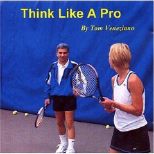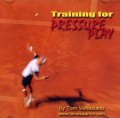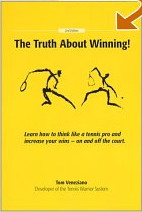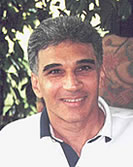If your tennis training is short on repetition, you are denying yourself more benefits than you might realize. Not only are you handicapping your physical game, but you are missing out on tremendous mental training! I have often discussed repetition -- hitting ball after ball with a pro, on a ball machine, in on-court practice drills, in practice matches, in tournament play and even against the wall -- and how this challenges the senses to begin molding tennis strokes and generate instinctive play. But there is more to repetition than mastering the physical game. It also helps overcome mental challenges. Within the process of dedicated, consistent physical practice are what I call the "Eight Mental Dynamics of Repetition." Together they form the critical building blocks of mental toughness.
Mental Dynamic #1: Handling Failures
Failures are inevitable during the repetition process, and no doubt you will have plenty of them. Make them productive! Take advantage! Each missed shot gives you the perfect opportunity to practice recovering from your failures. In an intensive training session you will quickly learn to apply "the next shot is more important than the last mistake." Why? Because another ball is on its way! There is no time to whine, complain or get emotional about mistakes. The game must go on. As coach, I always encourage struggling players to FORGET THE MISTAKE AND MOVE ON.
Mental Dynamic #2: Learning to "Let It Happen"
"Tightening up" on the court is another natural inevitability when executing lots of reps. Be thankful when this happens during practice, because it will help you sharpen a mental skill that is essential in match play. Anytime you start to feel tense, you must learn to relax your muscles and your mind and just LET THE STROKES HAPPEN. I have to constantly tell my players to relax and keep swinging in order to help them experience what "letting it happen" actually feels like. It is a difficult mental attitude to master, particularly when players want to "force it" instead or when they let themselves become distracted by the tension.
Mental Dynamic #3: Improving Concentration
Whether you feel happy, tired, bored, excited, or despondent, you must discipline your mind to keep concentrating throughout every practice. Learning to focus, control your own mind and keep plugging will in turn improve your concentration. Remind yourself of this maxim: "The key to tennis is consistency, the key to consistency is concentration, the key to concentration is self-discipline, and the key to self-discipline is YOU." Now, what is the key to you? I haven't the faintest idea! You are on your own there.
Mental Dynamic #4: Coping with Up and Down Cycles
This much is certain -- your game is going to fluctuate. When executing a lot of repetition you will frequently go from hitting well to hitting poorly. Changes like this can happen from week to week, day to day or even minute to minute. Good and bad cycles happen to club players as well as top pros, during everyday drills as well as within matches. You must practice coping with these fluctuations, taking care to not become too exhilarated by successes or too despondent over failures. Repetition teaches you to accept the ups and downs as part of the learning process.
Mental Dynamic #5: Keeping Tabs on Yourself
In a competitive match, you must keep tabs on your mental attitude at all times and make changes when necessary. My job in practice sessions is to teach every student that they have control over their mental attitude and through monitoring themselves can recognize problems and make changes. Being aware is half of the battle! The more repetition training you do, the better you learn to keep track of your bad mental states as well as the good so you can adjust accordingly.
Mental Dynamic #6: Building Confidence
As you begin to improve mentally as well as physically from repetition, your confidence will soar! You will see clearly that true confidence sustains itself though successes and failures.
Mental Dynamic #7: Developing Mental Match-Play Skills
In many ways, repetition training parallels your typical match-play conditions. All the match-play skills are incorporated right into the learning process. Every attribute is there, just waiting to be learned and applied: handling failures, improving concentration, building confidence, and so forth. Repetition is a dynamic tool to speed up the mental toughness process. The only way you can lose is if you reject the principles and refuse to learn!
Mental Dynamic #8: Emphasizing Repetition, Not Technique
When repetition is emphasized as the means to improvement and success, the focus is placed on you, the player, and not on external techniques. As a result, you do not rely solely on technique to win. Instead, mental skills play a major role in your ability to win matches, even on those days when the physical skills let you down. With the strength of your mental skills comes an unshakeable toughness. In his excellent book, "Tournament Toughness," Carlos Goffi writes, "Tournament toughness is that mental resilience and flexibility that separates the champions from the pack, allowing them to win against opponents who are technically more skillful and physically more powerful, even when they themselves are playing poorly." And where does that mental resilience and flexibility come from? You guessed it, the repetition process.
As you can see, physical repetition is intrinsically connected with mental training. In the Tennis Warrior System they are two sides of the same coin. While learning natural and instinctive physical skills, you are at the same time developing the mind of a champion.
When I coach, I help my players to understand these eight mental dynamics and why they are connected to the physical training process, but I don't necessarily emphasize them from an intellectual standpoint. Mental skills are best learned through application. Players tend to remember a solution if it is taught while they are actually experiencing the problem. For example, during a practice I wait for a bad cycle to occur in my student's play. At that exact moment I yell out, "Wait out the cycle, just keep swinging, you will cycle back toward better play, hang in there!" As the student experiences a shift back to better play, a valuable lesson is learned. And later, when he or she faces the same challenge during a match, they are more likely to recall and apply what they learned in practice. All eight mental dynamics are best learned in this fashion, through application and experience, not just academic instruction.
Since you are now aware of these eight mental dynamics, you can make your own application in your repetition practice sessions. The mental skills CAN be learned through physical repetition. I have been doing this with the Tennis Warrior System for years. With repetition as your teacher you can do the same!










 You will join 13,000 other subscribers in receiving news of updates to the Tennis Server along with monthly tennis tips from tennis pro Tom Veneziano.
You will join 13,000 other subscribers in receiving news of updates to the Tennis Server along with monthly tennis tips from tennis pro Tom Veneziano. 